As a loving pet parent, you probably want to share every moment with your canine companion, including meal times. However, while some human foods are safe and even beneficial for dogs, many others, particularly certain types of meat and meat products, can be extremely dangerous, leading to severe illness or even death. Understanding What Meat Should Never Be Fed To Dogs is crucial for safeguarding their health and ensuring they lead a happy, long life. Pet poisonings are a significant threat, with hundreds of thousands occurring annually in the United States alone. While not all are food-related, common household foods, especially certain meats, are major contributors.
This comprehensive guide from Dog Care Story will serve as your essential reference, highlighting the specific meats and meat-related items that pose risks, why they are harmful, and what steps to take if your dog accidentally ingests them. We aim to equip you with the knowledge to make informed decisions about your dog’s diet, protecting them from preventable harm and promoting their overall well-being. For a broader understanding of general food safety, you might also find our article on what foods can dogs eat with upset stomach helpful.
Why Certain Foods, Especially Meats, Are Toxic to Dogs
The digestive and metabolic systems of dogs differ significantly from humans. This means substances our bodies process safely can be toxic to canines. When it comes to meat and meat products, several factors contribute to their potential danger:
- Metabolic Differences: Dogs’ bodies process certain compounds differently. For instance, some preservatives or flavorings found in processed meats might be harmless to humans but difficult or impossible for dogs to metabolize.
- High Fat Content: Many human meat dishes are rich in fat, which can overwhelm a dog’s pancreas, leading to pancreatitis – a painful and potentially life-threatening inflammation.
- Bacterial Contamination: Raw or undercooked meats can harbor harmful bacteria like Salmonella and E. coli, which can cause severe gastrointestinal distress and systemic illness in dogs.
- Choking Hazards and Internal Damage: Bones, especially cooked ones, can splinter and cause choking, or internally lacerate the stomach and intestines.
- Toxic Seasonings and Ingredients: Meats are often prepared with spices, herbs, and other ingredients that are highly toxic to dogs, such as onions, garlic, or excessive salt.
- Allergic Reactions: While less common, some dogs can develop allergies to specific types of meat protein, leading to digestive upset or skin issues.
Understanding these underlying reasons is key to appreciating why vigilance around your dog’s diet is so critical. Always consult your veterinarian if you have questions about specific foods your dog can or cannot eat.
The Absolute No-Go Zone: Meats Dogs Must Avoid
When considering what meat should never be fed to dogs, several categories stand out due to their inherent risks. These include fatty cuts, processed meats, raw or undercooked meats, and any meat containing bones or toxic seasonings.
1. Fatty Cuts of Meat, Skin, and Processed Meats
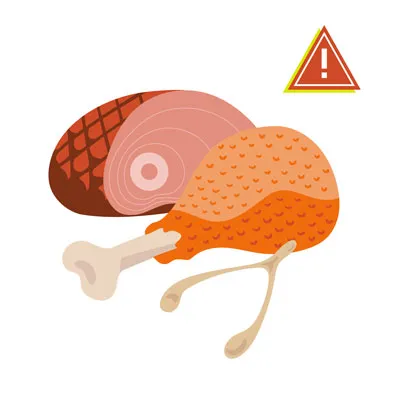 Fatty cuts of meat, ham, and chicken skin
Fatty cuts of meat, ham, and chicken skin
Many human-favorite meat products, while delicious to us, are hazardous for dogs due to their high fat and sodium content, or the presence of harmful additives.
- Ham, Bacon, and Other Fatty Cuts of Meat: These are particularly dangerous. Ham is often cured and high in sodium, which can lead to salt poisoning. The high-fat content in ham, bacon, and other fatty trimmings (like the skin from chicken or turkey) can trigger acute pancreatitis in dogs. This is a severe inflammation of the pancreas that can cause intense abdominal pain, vomiting, diarrhea, and in critical cases, be life-threatening. Instead of fatty table scraps, consider healthy alternatives like lean, cooked meats without seasoning.
- Processed Meats (Sausages, Hot Dogs, Deli Meats): These often contain high levels of sodium, fat, and artificial preservatives, all of which are detrimental to a dog’s health. The excessive salt can lead to dehydration and salt poisoning, while the fat contributes to pancreatitis. Many processed meats also contain spices like garlic or onion powder, which are toxic to dogs.
2. Cooked Bones
While it might seem natural to give a dog a bone, cooked bones are extremely dangerous. The cooking process makes bones brittle and prone to splintering. These sharp fragments can:
- Cause Choking: Bones can get lodged in your dog’s throat or esophagus.
- Obstruct the Digestive Tract: Pieces can block the stomach or intestines, requiring emergency surgery.
- Puncture Internal Organs: Sharp bone fragments can perforate the stomach or intestinal walls, leading to severe internal bleeding and fatal abdominal infections.
- Cause Constipation: Bone fragments can lead to painful and difficult bowel movements.
It’s safer to avoid giving your dog any cooked bones from poultry, beef, pork, or any other animal. If you want to offer a chew, opt for veterinarian-approved dental chews or safe, raw recreational bones under supervision.
3. Raw or Undercooked Meat
While some proponents advocate for raw food diets, feeding your dog raw or undercooked meat comes with significant risks that many experts advise against.
- Bacterial Contamination: Raw meat can be contaminated with bacteria such as Salmonella, E. coli, Listeria, and Clostridium. These bacteria can cause severe gastrointestinal upset in dogs, including vomiting, diarrhea, and fever. More concerning, they can also be transmitted to humans through contact with the dog or its feces, posing a public health risk.
- Parasites: Raw meat can contain parasites (like Toxoplasma gondii or Trichinella) that can infect dogs, leading to various health problems. While cooking typically kills these parasites, raw meat leaves your dog vulnerable.
- Nutritional Imbalances: A raw meat-based diet, if not carefully formulated by a veterinary nutritionist, can lead to severe nutritional deficiencies or excesses, impacting your dog’s long-term health.
- Choking on Raw Bones: Although raw bones are less likely to splinter than cooked ones, they still pose a choking hazard and can cause dental damage or internal blockages.
The possible Salmonella or E. coli that is sometimes found in raw meat can be harmful to dogs too, not just humans. The safest approach is to ensure all meat given to your dog is thoroughly cooked to eliminate harmful pathogens and remove all bones. For more information on dietary choices, refer to our article on what food can we give to dogs.
4. Heavily Seasoned or Spiced Meats
Any meat that has been seasoned for human consumption should be kept away from dogs. Many common seasonings contain ingredients toxic to canines or can cause severe digestive upset.
- Onions, Garlic, Chives, and Leeks: These belong to the Allium family and are highly toxic to dogs. They contain sulfoxides and disulfides that can damage red blood cells, leading to hemolytic anemia, weakness, vomiting, and even death. Onion and garlic powders are potent and often hidden in sauces, marinades, and processed meats. Certain Japanese breeds, like Akitas and Shiba Inus, are particularly sensitive.
- Excessive Salt: Too much salt can disrupt a dog’s electrolyte balance, leading to sodium ion poisoning. Symptoms include excessive thirst and urination, vomiting, diarrhea, tremors, seizures, and even coma. This is a common issue with seasoned meats, cured meats, and salty snacks.
- Spicy Foods: Hot or spicy seasonings (e.g., chili powder, cayenne pepper) can irritate a dog’s mouth, throat, and digestive tract, leading to vomiting, diarrhea, stomach ulcers, and general discomfort.
- Nutmeg and Cinnamon: Nutmeg contains myristicin, which can cause hallucinations, severe vomiting, disorientation, increased heart rate, and high blood pressure, especially in small dogs or in large doses. While cinnamon isn’t toxic, it can irritate the mouth and lead to low blood sugar if consumed in large amounts.
It is always best to offer your dog plain, unseasoned, cooked meat. For a detailed list of other dangerous items, our article on what are foods that dogs cannot eat offers valuable insights.
Other Dangerous Foods Dogs Should Never Eat (Beyond Meat)
While the focus here is on meat, it’s essential to recognize that many other common human foods are also highly toxic to dogs. Being aware of these additional hazards helps ensure a safe home environment for your pet.
1. Alcohol
Because dogs are smaller than humans, alcohol has a deadlier effect on them. Even small amounts can cause harm. Symptoms of alcohol poisoning in dogs mirror those in humans: vomiting, disorientation, breathing problems, coma, or even death.
2. Fruit Seeds/Pits (Apple, Apricot, Cherry, Plum)
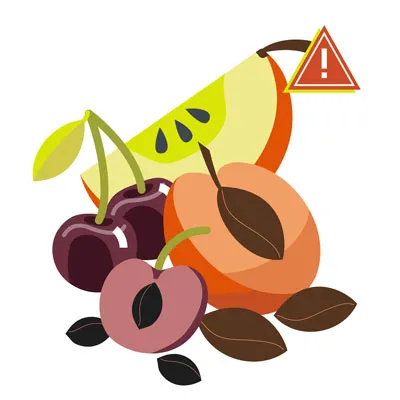 Apple, apricot, cherry, and plum seeds and pits
Apple, apricot, cherry, and plum seeds and pits
While the fleshy parts of many fruits are safe, the seeds and pits can be problematic. Apple seeds, along with the pits of apricots, cherries, and plums, contain cyanide. In large quantities, cyanide can lead to symptoms like vomiting, irregular heartbeat, seizures, and coma by impairing red blood cells’ ability to carry oxygen. Additionally, large pits can cause gastrointestinal obstruction.
3. Avocado
Avocados contain persin, a fungicidal toxin that can cause myocardial damage in some animals. While not all dogs are equally sensitive, it’s best to avoid feeding avocado. Furthermore, an intact avocado pit poses a significant risk of gastrointestinal obstruction if swallowed.
4. Broccoli
Broccoli contains isothiocyanates, which can be harmful in very large doses. Small amounts might be okay occasionally, but larger quantities can lead to gastrointestinal irritation. The stalks can also be a choking hazard for some dogs.
5. Caffeine and Coffee Grounds
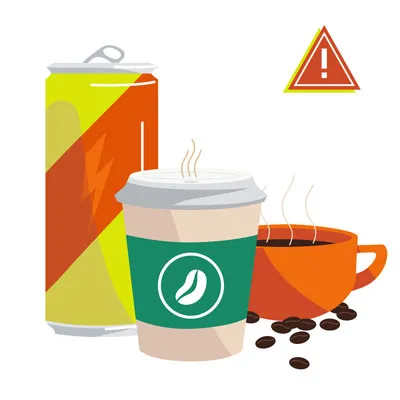 Caffeine and coffee grounds
Caffeine and coffee grounds
Caffeine, found in coffee grounds, coffee, tea, and energy drinks, contains methylxanthines. These stimulants can cause hyperactivity, vomiting, diarrhea, tremors, seizures, abnormal heart rhythm, and potentially fatal cardiac arrest. Even small amounts can be dangerous.
6. Chocolate
Chocolate is highly toxic to dogs due to the presence of theobromine and caffeine. Dogs metabolize these substances much slower than humans, allowing them to accumulate to toxic levels. Dark chocolate and baker’s chocolate are the most dangerous, but any type of chocolate can be problematic. Symptoms include hyperactivity, vomiting, diarrhea, pancreatitis, abnormal heart rhythm, and seizures. If your dog ingests chocolate, contact your vet immediately.
7. Grapes and Raisins
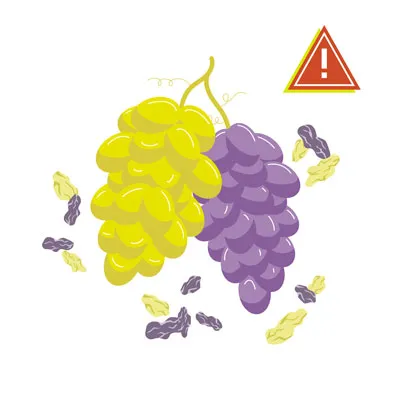 Grapes and raisins
Grapes and raisins
Grapes and raisins are extremely dangerous for dogs and can cause acute kidney failure. The exact mechanism of toxicity is still unknown, but even a small amount can be fatal. Symptoms include vomiting, diarrhea, lethargy, loss of appetite, increased thirst, and decreased urine production.
8. Macadamia Nuts, Almonds, and Pistachios
Macadamia nuts are highly toxic to dogs, causing weakness, tremors, overheating, and vomiting, even in small quantities (as few as six nuts can cause severe poisoning). While the exact toxic mechanism is unclear, it’s best to avoid them entirely. Other nuts like almonds and pistachios are not inherently toxic but pose choking hazards, and their high-fat content can lead to pancreatitis. Flavored or spiced nuts should also be avoided due to added harmful ingredients.
9. Milk and Dairy Products
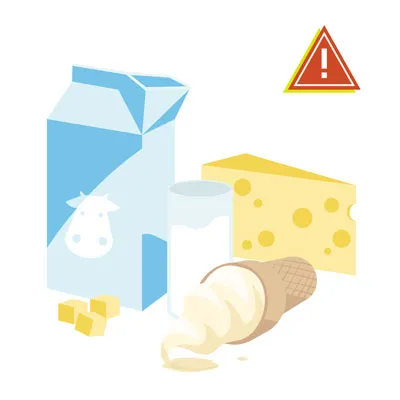 Milk and dairy products
Milk and dairy products
Many dogs are lactose intolerant, meaning they lack the enzyme to digest lactose in milk. Consuming milk or dairy products can lead to digestive upset, including diarrhea and gas. Ice cream is also problematic due to high sugar and fat content. Small amounts of low-fat cheese might be tolerated by some dogs, but it’s generally safer to avoid large quantities of dairy.
10. Mushrooms
It’s best to avoid feeding your dog wild mushrooms, as many species are highly toxic and can cause kidney and liver failure, vomiting, diarrhea, hallucinations, and red blood cell damage. While washed white mushrooms from the grocery store may be less risky, it’s generally safer to choose other treats due to the difficulty in distinguishing safe from toxic varieties.
11. Salt
Excessive salt intake can lead to sodium ion poisoning, disrupting the fluid balance in a dog’s cells. Symptoms include tremors, seizures, vomiting, diarrhea, and potentially coma. Avoid giving your dog salty snacks like potato chips, pretzels, or any food seasoned with too much salt.
12. Spicy Food
Spicy foods can cause significant irritation and distress to a dog’s sensitive digestive system. They can lead to vomiting, diarrhea, and even stomach ulcers, causing considerable pain and requiring veterinary intervention.
13. Sugar-Free Gum & Candy (Xylitol)
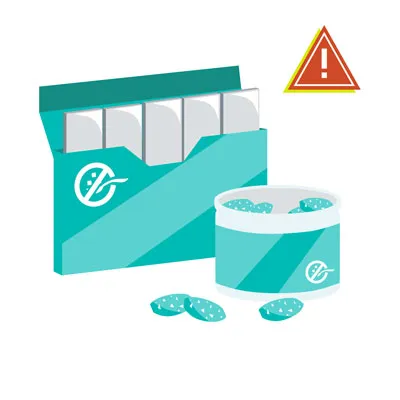 Sugar-free gum and candy containing xylitol
Sugar-free gum and candy containing xylitol
Xylitol is an artificial sweetener found in many sugar-free products like gum, candy, baked goods, and even some peanut butters. It is extremely toxic to dogs, causing a rapid and dangerous drop in blood sugar (hypoglycemia), leading to weakness, seizures, and even liver failure. Even a small amount can be fatal for a medium-sized dog. Always check ingredient labels for xylitol.
14. Tomatoes and Raw Potatoes
Ripe red tomatoes are generally safe in moderation. However, the green parts of the tomato plant (stems, leaves) and unripe green tomatoes contain solanine, a glycoalkaloid that is toxic to dogs, causing gastrointestinal upset and neurological symptoms. Similarly, cooked potatoes without additives are generally safe, but raw potatoes also contain solanine and should be avoided.
15. Tobacco
Tobacco contains nicotine, which is highly toxic to dogs. Ingesting cigarettes, cigarette butts, e-liquids, or other nicotine products can lead to vomiting, diarrhea, rapid breathing, agitation, abnormal heart rate, tremors, seizures, and in severe cases, coma and death. Due to dogs’ curious nature, they often ingest these items accidentally, necessitating immediate veterinary attention.
16. Yeast and Raw Dough
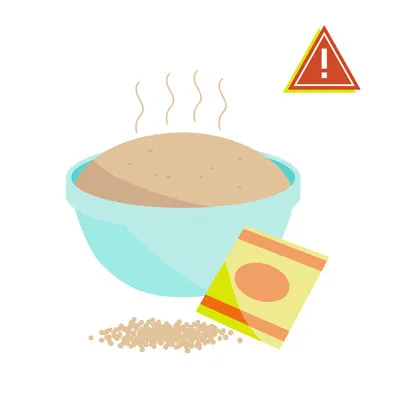 Yeast and raw dough
Yeast and raw dough
Raw dough containing yeast is unsafe for dogs. The dough can expand in their warm stomach, causing severe bloating, pain, and potentially life-threatening gastric torsion or rupture. Furthermore, the yeast and sugar in raw dough ferment, producing alcohol, which can lead to alcohol toxicity. This requires immediate medical intervention.
17. Rhubarb
Rhubarb leaves contain soluble calcium oxalate crystals, which can bind with calcium in the body, leading to a dangerous drop in calcium levels and potentially renal failure if consumed in large enough quantities. Symptoms include tremors, weakness, drooling, bloody urine, and changes in thirst and urination.
18. Star Fruit
Similar to rhubarb, star fruit also contains soluble calcium oxalate crystals and should not be fed to dogs.
19. Flavored Water and Seltzer Water
It’s always best to offer your dog fresh, plain water. Flavored or carbonated waters can contain added sugars, salts, or artificial sweeteners (like xylitol) that are harmful to pups. Plain seltzer water might cause gas and bloating.
Identifying At-Risk Dogs
While all dogs are vulnerable to toxic foods, certain factors can increase their risk:
- Small Breeds: Smaller dogs are more susceptible to toxicity due to their lower body weight. A smaller amount of a toxic substance can have a much more severe effect on a tiny dog compared to a large breed.
- Puppies: Young dogs have less developed digestive and immune systems, making them more vulnerable to bacterial infections from raw meats and more sensitive to toxins.
- Elderly Dogs: Older dogs may have compromised immune systems or pre-existing health conditions (like kidney or liver disease) that make them less able to metabolize toxins or recover from illness.
- Dogs with Pre-existing Conditions: Pets with diabetes, kidney disease, pancreatitis history, or gastrointestinal sensitivities are at higher risk. For instance, a dog with a history of pancreatitis should strictly avoid fatty meats.
Understanding your dog’s individual risk factors can help you be even more diligent about food safety.
Preventing Accidental Ingestion of Harmful Foods (Including Meats)
Accidents happen, but proactive measures can significantly reduce the risk of your beloved pup ingesting unsafe human food.
- Store Foods Out of Reach: Keep all potentially toxic foods, especially meats, high on shelves or secured in cabinets that your dog cannot access. Never leave tempting items like a plate of ham or a chocolate bar on counters or low tables.
- Avoid Feeding Dogs from Your Plate: Resist the urge to share your meal with your dog, even if it’s just a small bite. This reinforces begging behavior and makes it harder for your dog to distinguish between safe and unsafe foods. It’s safest to only give your pup treats specifically made for dogs.
- Educate Family Members and Guests: Ensure everyone in your household, including children and visitors, understands the dangers of feeding human food to your dog. Emphasize that no matter how much your dog begs, they should not sneak any food.
- Be Careful During Holidays and Gatherings: The busy atmosphere of holidays (like Thanksgiving or Christmas) often involves large meals and many tempting foods. This is a prime time for accidental ingestion. Be extra vigilant about securing food and educating guests. If you’re wondering what human food can dogs eat as a meal or as treats during these times, stick to vet-approved safe options.
If your precautions fail and your dog eats something toxic, being prepared can make all the difference. Keep contact information readily available for emergency veterinarians who are open 24/7, and for poison control centers.
Emergency Steps: When Your Dog Eats Something Toxic
If you suspect your dog has eaten something toxic, including dangerous meats, swift action is crucial.
- Recognize the Symptoms: Familiarize yourself with common signs of food toxicity, which can vary depending on the ingested substance. These may include listlessness, distress, abdominal pain, vomiting, diarrhea (possibly bloody), excessive drooling, tremors, seizures, bloating, weakness, or changes in behavior. If you notice any concerning symptoms, act immediately.
- Call Your Veterinarian or Poison Control Immediately: Do not wait to see if your dog gets better. Time is vital in treating poisoning cases. The sooner your dog receives professional help, the better the prognosis. Have your vet’s number and a pet poison control hotline (like ASPCA Animal Poison Control or Pet Poison Helpline) readily accessible.
- Provide All Important Information: When you call, be ready to provide details such as:
- The type of food or substance eaten (e.g., “raw chicken bone,” “ham with onion seasoning,” “chocolate bar”).
- The estimated amount consumed.
- The approximate time of ingestion.
- Your dog’s breed, age, and weight.
- Any symptoms your dog is currently exhibiting.
- Avoid Home Remedies Unless Advised by a Vet: Do not try to induce vomiting or administer any home remedies without explicit instructions from a veterinarian or poison control expert. In some cases, inducing vomiting can be harmful (e.g., if the substance is corrosive or if the dog is already showing neurological symptoms).
Safe Alternatives: Healthy Human Foods Your Dog Can Enjoy
While the list of forbidden foods can seem daunting, there are many safe and healthy human foods you can share with your dog in moderation. These can make excellent, nutritious treats. Always ensure they are plain, unseasoned, and properly prepared. For comprehensive details, check out our guide on what people food can dogs eat.
- Lean, Cooked Meats (Unseasoned and Boneless):
- Chicken and Turkey: Cooked, plain, boneless, skinless chicken or turkey breast is an excellent source of lean protein. Ensure no seasonings, fat, or skin are present.
- Beef: Small amounts of plain, cooked, lean beef (e.g., ground beef, steak) without any fat trimmings or seasonings.
- Fish: Plain, fully cooked, boneless fish like salmon or sardines are rich in omega-3 fatty acids. Avoid raw fish or fish with bones.
- Shrimp: Plain, fully cooked, shelled, and de-veined shrimp.
- Fruits (in moderation, seeds/pits removed):
- Apples: Flesh only, no core or seeds.
- Bananas: Without the peel, in small amounts.
- Blueberries & Blackberries: Excellent sources of antioxidants.
- Cantaloupe, Mango, Peaches, Pears, Pineapples, Watermelon: Remove all rinds, seeds, and pits.
- Oranges: Small amounts, peeled and deseeded.
- Vegetables:
- Carrots: Great for dental health.
- Cucumber: Low in calories, hydrating.
- Celery: Crunchy and can help with bad breath.
- Green Beans: Raw, steamed, or canned (no added salt/spices).
- Broccoli: Very small amounts, cooked, for some dogs.
- Other Safe Foods:
- Cooked Eggs: A good source of protein; scrambled eggs can soothe an upset stomach.
- Cheese: Small amounts of low-fat varieties, if your dog is not lactose intolerant.
- Peanut Butter: Unsalted, unsweetened, and xylitol-free varieties only, in moderation.
- Popcorn & Corn: Air-popped, plain popcorn (no salt, butter) and corn removed from the cob (plain).
- Coconut & Honey: Small amounts of coconut flesh, milk, or oil (no shell); honey in moderation.
- Grains, Wheat, Quinoa: Cooked and plain, in small quantities.
Always introduce new foods slowly and in small amounts to monitor for any adverse reactions.
Conclusion
Ensuring the safety of your canine companion requires diligence, especially regarding their diet. Understanding what meat should never be fed to dogs, along with other toxic human foods, is paramount for preventing serious health issues. Fatty meats, raw or undercooked meats, cooked bones, and any meat seasoned with toxic ingredients like onions or garlic pose significant risks, from pancreatitis and bacterial infections to choking and organ damage.
By being mindful of storage, avoiding table scraps, educating your family, and exercising caution during holidays, you can create a safer environment for your furry friend. Should an accidental ingestion occur, immediate contact with your veterinarian or a pet poison control center is crucial. Remember, many safe and healthy human foods can be enjoyed by your dog, providing nutritious treats without the risk. Always consult your veterinarian if you are unsure about any food item or if your dog displays concerning symptoms. Protecting your dog from unexpected toxins is a continuous effort, and being informed is your best defense.
Reviewed by Dr. Fiona Lee
Sources/Citations
- “Top 10 dog poisons,” Hilary Parker (5/2023), WebMD, https://www.webmd.com/pets/dogs/top-10-dog-poisons
- “What happens if a dog eats chocolate?” (10/2023), Colorado State University, https://vetmedbiosci.colostate.edu/vth/animal-health/why-is-chocolate-bad-for-dogs/
- “Fruits and vegetables dogs can or can’t eat,” (3/2024), American Kennel Club, https://www.akc.org/expert-advice/nutrition/fruits-vegetables-dogs-can-and-cant-eat/
- “What to do if your dog drinks alcohol,” Jerry Klein (7/2023), American Kennel Club, https://www.akc.org/expert-advice/vets-corner/is-alcohol-dangerous-for-dogs/
- “Can dogs eat apples?” Hector Joy (12/2022), PetMD, https://www.petmd.com/dog/general-health/can-dogs-eat-apples
- “Can dogs eat plums?” Katie Koschalk (7/2023), Chewy, https://be.chewy.com/nutrition-pet-diet-tips-can-dogs-eat-plums/
- “Avocado (Persea spp) Toxicosis in Animals,” Cristine Hayes (9/2024), Merck Veterinary Manual, https://www.merckvetmanual.com/toxicology/food-hazards/avocado-persea-spp-toxicosis-in-animals
- “People foods to avoid feeding your pets,” (n.d.), ASPCA, https://www.aspca.org/pet-care/animal-poison-control/people-foods-avoid-feeding-your-pets
- “People foods dogs can and can’t eat,” (3/2024), American Kennel Club, https://www.akc.org/expert-advice/nutrition/human-foods-dogs-can-and-cant-eat/
- “Can dogs eat nuts?” Amanda Ardente (1/2023), PetMD, https://www.petmd.com/dog/nutrition/can-dogs-eat-nuts
- “Can dogs drink milk?” Sandra C. Mitchell (1/2024), PetMD, https://www.petmd.com/dog/nutrition/can-dogs-drink-milk
- “Can dogs have nutmeg?” Barri J. Morrison (11/2023), PetMD, https://www.petmd.com/nutmeg-safe-dogs
- “Onion, garlic, chive, and leek poisoning in dogs,” Renee Schmid et al. (2024), VCA Animal Hospitals, https://vcahospitals.com/know-your-pet/onion-garlic-chive-and-leek-toxicity-in-dogs
- “Can dogs eat tomatoes?” Anna Burke (10/2024), American Kennel Club, https://www.akc.org/expert-advice/nutrition/can-dogs-eat-tomatoes/
- “Can dogs eat potatoes?” Katherine Ripley (11/2023), American Kennel Club, https://www.akc.org/expert-advice/nutrition/can-dogs-eat-potatoes/
- “What to do if your dog eats a cigarette butt,” (6/2023), American Kennel Club, https://www.akc.org/expert-advice/health/dog-ate-cigarette-butt/
- “Dough & dogs: Why it’s bad and what you can do,” Lisa Goldstein (7/2024), Preventive Vet, https://www.preventivevet.com/dogs/dough-is-toxic-to-dogs
- “Rhubarb,” (n.d.), Pet Poison Helpline, https://www.petpoisonhelpline.com/poison/rhubarb/
- “Can dogs drink carbonated water?” Heather Logue (n.d.), Rover, https://www.rover.com/blog/can-dogs-drink-carbonated-water/
- “What fruits can dogs eat?” Ellen Malmanger (2/2024), PetMD, https://www.petmd.com/dog/nutrition/what-fruits-can-dogs-eat
- “Can dogs have green beans?” Anna Burke (8/2022), American Kennel Club, https://www.akc.org/expert-advice/nutrition/can-dogs-have-green-beans/
- “About pet food safety,” (4/2024), CDC, https://www.cdc.gov/healthy-pets/about/pet-food-safety.html
